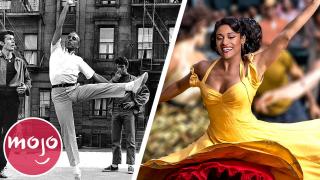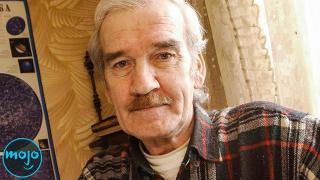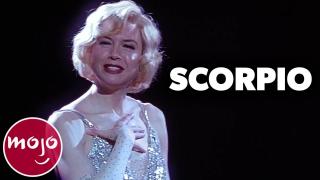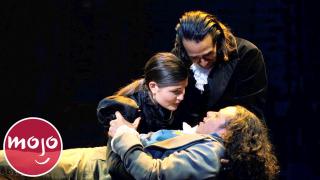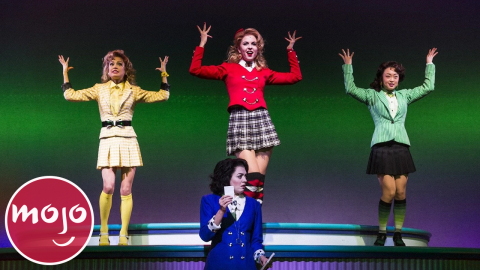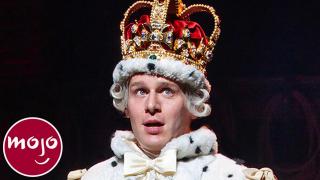Top 20 Greatest Musical Theatre Duets EVER

Welcome to MsMojo, and today we’re counting down our picks for the Top 20 Best Musical Theatre Duets. For this list, we’ll be looking at the most captivating songs from the musicals that were written for two characters to perform together. Although movie musicals often transfer to Broadway, we won’t be including any songs that didn’t originate in musicals. Some of these duets are crucial to the plot though, so beware of spoilers! Which musical theater duo has the best musical chemistry? Let us know in the comments!
#20: "Move On"
Did Humans Move To Earth From Another Planet? | Unveiled
“Sunday in the Park with George”
Loosely based on the life of the painter Georges Seurat, this award-winning musical is a comic and moving exploration of art and reasons we make it. Themes of embracing change and trusting yourself artistically are brought to the fore in this number. Dot, Serault’s former lover and muse, returns to him in a vision. The bittersweet duet that follows is musically complex with simple, heartfelt lyrics. The legendary Bernadette Peters originated the role of Dot and Mandy Patinkin, her original Georges, made the perfect duetting partner. We also love his rendition of “Lily’s Eyes” from “The Secret Garden.” “Move On” is a difficult piece, but spectacular when done well.
#19: “Dear Theodosia”
“Hamilton”
Lin-Manuel Miranda has written some fabulous duets for stage and screen. One of our favorites is “When You’re Home” from his debut musical “In the Heights.” The feel-good number bolsters Benny and Nina’s budding romance, but the lyrics also tackle themes of displacement and alienation. “Hamilton”’s “Dear Theodosia” isn’t a traditional love song, either. Instead, it explores the bond between two fathers and their newborn children. It’s a tender, heartfelt lullaby that reveals a softer side to the powerful men who sing it. The duet also highlights the similarities between the rivals. Hamilton and Burr know what it’s like to not have a dad, and are determined to create a better future for their little ones.
#18: “All the Wasted Time”
Top 10 Best Musical Duets
“Parade”
“Parade” is the story of a Jewish factory worker, falsely accused of a terrible crime. It’s a who-dunnit, a courtroom drama and a political think-piece, but at its heart is a love story. “All the Wasted Time” is a duet between the protagonist and his wife, Lucille, who stands by her husband when the world turns against him. Accompanied by a simple and moving piano refrain, Leo Frank wonders aloud what he did to deserve her. The song becomes a sorrowful shared lament of missed opportunities and love taken for granted. It’s touching and tragic - especially once it becomes clear that these are the couple’s final moments together.
#17: “This World Will Remember Us”
Top 10 Most Important LGBTQ+ Musical Theatre Moments
“Bonnie & Clyde”
One of the key ingredients of a musical theater duet is chemistry - and Bonnie and Clyde have it in spades. The show’s killer combination of sultriness and Southern charm is heightened by toe-tapping music. While plenty of different genres are utilized, one duet between the girls has a traditional musical theater flavor. Still, our favorite numbers focus on the killer couple themselves. In “This World Will Remember Me”, Clyde and Bonnie get to know one another. But it’s not until the pivotal "This World Will Remember Us" that she goes all in, joining him in this life of crime and birthing a legend. Their excitement is infectious, and we love the bluesy tone to Clyde’s voice.
#16: “Before and After You/One Second and a Million Miles”
Top 10 Iconic Musical Theatre Costumes
“The Bridges of Madison County”
Based on the novel by Robert James Waller, “The Bridges of Madison County” centers around a brief but passionate love affair. Francesca is a farm wife in 1960s Iowa, unhappy in her marriage and homesick for her native Italy. When she falls for Robert, a traveling photographer, he opens up a whole new world of possibilities. While the act one duet “Falling Into You” explores the couple’s burgeoning feelings for each other, “Before and After You” is the real turning point. This is the moment when Robert asks Francesca to come away with him. Beginning as a moving and sensual ballad, the duet really hits its stride when the two voices join together in a powerful and emotional chorus.
#15: “Bad Idea”
Top 10 Greatest Broadway Dancers of All Time
“Waitress”
Jenna and Dr. Pomatter, the central couple from “Waitress,” get to perform some wonderful duets over the course of the show. “It Only Takes a Taste” showcases their growing attraction to each other. Later, we get the beautifully tender, not-quite-love song “You Matter to Me.” However, our favorite number has to be “Bad Idea.” In this scene, we see the couple briefly fight their feelings before finally giving in to their desires. They know it’s a bad idea and so do we - but we’re still cheering when they get together. The music ramps up the tension and the harmonies are great too - but “Bad Idea” is really all about that chemistry.
#14: "Do You Love Me?"
Top 10 Saddest Broadway Love Songs
“Fiddler on the Roof”
Most romantic duets concern themselves with young love or the feeling of falling in love for the first time. “Do You Love Me?” from “Fiddler on the Roof” bucks the trend. The song is a dialogue between an older married couple. Their union was arranged, but they’ve lived as husband and wife for twenty-five years. He asks her if she loves him and she doesn’t give her answer until the last moments of the duet, but we all know what it will be. It’s a simple, comedic song but also deeply romantic. Although the number isn’t sentimental on the surface, the audience can easily read between the lines and see that this couple are devoted to each other.
#13: “Sun and Moon”
Top 10 Things You Should NEVER Say to a Musical Theatre Fan
“Miss Saigon”
“Miss Saigon” is not the most cheerful musical in the world. What else would you expect from the people behind “Les Mis?” However, the show’s romantic duets offer a glimmer of hope in the darkness. “Last Night of the World” is beautifully bittersweet, but “Sun and Moon” has a sweetness and innocence that is uniquely heartbreaking. Young lovers Kim and Chris meet under sordid circumstances in war-torn Saigon. After the bombast of the opening number, “Sun and Moon” shines a spotlight on the young couple and their burgeoning and tentative feelings for each other. The musical turned Lea Salonga into a star, and when she sings this song, it’s easy to see why.
#12: "People Will Say We're in Love"
Top 10 Real People Who Actually SAVED the World
“Oklahoma!”
As with “Do You Love Me?”, you have to read between the lines of this Rodgers and Hammerstein classic to understand what the characters are really saying. In "People Will Say We're in Love", “Oklahoma!”’s Curly and Laurey serve each other with a laundry list of don’ts. If they do too many things that courting couples do, people might accuse them of being in love. The tongue-in-cheek lyrics create a flirtatious back and forth between two people who clearly do feel that way about each other, but aren’t yet ready to tell the world. Interestingly, the duet was reportedly important to the late Queen Elizabeth II and Prince Philip.
#11: “I Know Him So Well”
Top 20 Hardest Female Musical Roles
“Chess”
Benny Andersson and Björn Ulvaeus are best known for being part of ABBA, but they’ve also dabbled in musical theater. “Chess” features music from the dynamic duo, with the latter teaming up with Tim Rice to work on the lyrics. Set during the Cold War, it follows two grandmasters and their relationships. “I Know Him So Well” is the musical’s most famous song. It’s a compelling duet between the spouse and the lover of one of the protagonists, with Elaine Paige and Barbara Dickson’s version topping the UK charts back in 1985. With a memorable pop melody, simple, emotional lyrics and fantastic harmonies, the number remains one of the most memorable duets in musical theater history.
#10: “Suddenly, Seymour”
What if The Sun Suddenly Stopped Burning? | Unveiled
“Little Shop of Horrors”
For a musical about a flesh-eating plant named Audrey II, "Little Shop of Horrors" has some rather poignant tracks. Composed by Alan Menken with lyrics by Howard Ashman, "Suddenly, Seymour" is a wonderful duet that finally sees Seymour Krelborn and Audrey express their feelings for one another. Transpiring quite early in Act II, "Suddenly, Seymour" amounts to more than a simple love song. The duet elegantly displays Audrey's insecurities stemming from a tragic childhood and abusive relationships before Seymour steps in to lend a sympathetic hand. Rather than "I love you," "Suddenly, Seymour" says "I understand you."
#9: “Ten Minutes Ago”
Which Musical Should You Listen to Based On Your Sign?
“Cinderella”
The duo of composer Richard Rodgers and lyricist Oscar Hammerstein II are responsible for creating numerous Broadway classics during the golden age of musical theater. Seven years after Disney's "Cinderella," Rodgers and Hammerstein adapted the fairy tale into a live television broadcast starring Julie Andrews and Jon Cypher; unsurprisingly, the music frequently hits the mark. Sung by the Prince and Cinderella, "Ten Minutes Ago" serves as the musical's centerpiece, as this single track carries the responsibility of convincingly conveying the couple's instant mutual attraction. A classic ballad crafted by two industry heavyweights, "Ten Minutes Ago" is magical.
#8: “If I Loved You”
Top 10 Greatest Musicals of the 2000s
“Carousel”
Along with "Oklahoma!", "Carousel" serves as a prime example of a quintessential Rodgers and Hammerstein production, and the same can be said for the musical's iconic duet. Meeting earlier the same day and both out of a job, "If I Loved You" basically consists of Julie and Billy sheepishly trading hypothetical declarations of love. Coinciding with the iconic bench scene, "If I Loved You" brilliantly reflects the couple's unfortunate tendency to self-destruct while suggesting certain romances are better ignored. "Carousel" explores complex themes, and "If I Loved You" subverts the traditional love song.
#7: “All I Ask of You”
Ranking ALL the Songs from the Mean Girls Musical
“The Phantom of the Opera”
Picking out a single duet from "The Phantom of the Opera" is a near impossible task, but there is just something about Christine and Raoul's piano ballad that demands attention. Created by Andrew Lloyd Webber, Charles Hart, and Richard Stilgoe, "All I Ask of You" is Broadway's attempt at a pop song. Lyrically, the duet showcases Christine's inherent hunger for romance, a need Raoul is more than happy to satisfy. Devoid of cynicism or irony, "All I Ask of You" embodies a fundamental desire to discover warmth, safety, and freedom through a relationship. Even if the duet's themes are straightforward, "All I Ask of You's" brilliance lies in its masterful composition and lyrical sincerity.
#6: “Tonight”
“West Side Story”
A modern retelling of Shakespeare's "Romeo and Juliet," "West Side Story's" focus on social commentary, dance sequences, and electrifying music changed theater forever. While the rivalry between the Jets and the Sharks often overshadows Tony and Maria's romance, the star-crossed lovers sing one of "West Side Story's" greatest tracks in "Tonight." Occurring during the musical's equivalent of "Romeo and Juliet's" iconic balcony scene, "Tonight" boasts a legendary melody and immaculate lyricism that highlight Tony and Maria's passionate romance while foreshadowing the eventual doom awaiting the couple.
#5: “Take Me or Leave Me”
Top 10 Greatest Broadway Swan Songs
“Rent”
Although much of the plot takes place in 1989, everything about Jonathan Larson's musical screams the '90s. Taking place in the aftermath of the AIDS crisis, "Rent" combines alternative rock and an impressively diverse cast to tell a story fitting of its era. Joanne and Maureen's break-up duet, "Take Me or Leave Me," is just as much about the characters' refusal to change as it is about the couple's relationship. Backed by an energetic composition wisely removed from the musical's predominantly rock sound, "Take Me or Leave Me" is a product of a bygone era that has aged gracefully.
#4: “The Confrontation”
Top 10 Greatest Classic Broadway Singers
“Les Misérables”
The longest-running musical in London's West End, "Les Misérables" persevered in the face of initial critical backlash to emerge as a landmark production. Taking place in 19th-century France, it quickly establishes the adversarial dynamic between the reformed fugitive Valjean and the police officer obsessed with arresting him, Javert. A slow-paced but intense number, "The Confrontation" marks the point these two finally came face to face. Pitting Javert's staunch legalism against Valjean's sense of justice in a phenomenal alternating stanza, "The Confrontation" is critical in establishing arguably "Les Misérables'" central relationship.
#3: “For Good”
Top 20 Greatest Broadway Singers of All Time
“Wicked”
Based on Gregory Maguire's 1995 novel, "Wicked" retells "The Wizard of Oz" from the perspective of Elphaba – the Wicked Witch of the West – and Galinda the Good Witch, who form an unlikely friendship despite the pair's conflicting personalities. As the musical's penultimate track, "For Good" immortalizes Elphaba and Glinda's charming relationship that helped both witches mature into better people. Elphaba and Fiyero's "As Long As You're Mine" also deserves a shout out, but the bittersweet "For Good" caps an emotional journey and provides closure to Elphaba and Glinda's endearing dynamic.
#2: “Anything You Can Do”
All the Heathers: the Musical Songs: RANKED!
“Annie Get Your Gun”
Once in a blue moon, a song comes along that transcends Broadway but remains inherently associated with musical theater. Debuting in 1946, "Annie Get Your Gun"’s songs have been covered by countless famous musicians, but the playful "Anything You Can Do" requires the stage to truly come alive. Seeking to outdo each other, Annie and Frank put their vocals through the wringer to see who can strike a higher or hold a longer note. For the era, "Anything You Can Do" was powerful and progressive. Stripped of context or subtext, it’s just a plain-old entertaining duet sung by two talented people who can do everything but bake pies.
Before we unveil our top pick, here are a few honorable mentions.
"Sixteen Going on Seventeen", “The Sound of Music”
A Flirtatious Dialogue Between Two Young Lovers
"(You're) Timeless to Me", “Hairspray”
Top 20 Hardest Male Musical Roles
This Infectious Comedy Duet Is Filled with Clever Wordplay
“Seventeen”, “Heathers: The Musical”
Top 10 Neil Patrick Harris Musical Moments
Veronica Longs for Her & J.D. to Be Normal Teenagers
“A Little Fall of Rain”, “Les Misérables”
Top 10 Broadway Musical Villains
A Heartbreaking Final Conversation Between Marius & Éponine
"A Boy Like That/I Have A Love", “West Side Story”
Top 10 Greatest Couples From Musicals
Anita & Maria Are At Odds In This Scene, but Their Voices Are In Perfect Harmony
#1: “You're the Top”
Top 24 Greatest Sports Moments of Each Year (2000 - 2023)
“Anything Goes”
Somehow, Cole Porter's song is simultaneously timeless and dated; however, rather than diminish "You're the Top"’s appeal, this only serves to enhance its charm. Spawning countless parodies, the duet sees Billy and Reno trade compliments while referencing everything from Mickey Mouse to the Tower of Babel and even broccoli. "Anything Goes" debuted during a time when stage shows seldom used musical numbers as tools to express serious dramatic plot points, and this number exemplifies that practice. Porter's bouncy duet is bigger than Billy and Reno or "Anything Goes," "You're the Top" is the 1930s.





